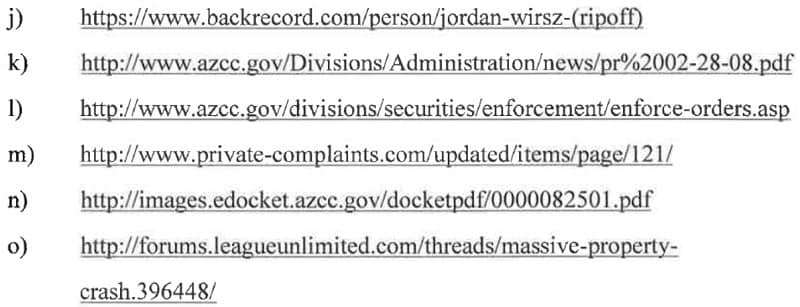The Volokh Conspiracy
Mostly law professors | Sometimes contrarian | Often libertarian | Always independent
Attempt to deindex government documents discussing regulatory violations by Nevada businessman
Jordan Wirsz runs Savant Investment Partners in Las Vegas. He's also the author of the 2012 self-help book "Become Incredible" and the 2007 "Maverick Millionaire." In 2008, though, he was the subject of an Arizona Corporation Commission enforcement action:
Diamond Bay Investments, Inc. and its company director, Jonathan Jordan Wirsz of Nevada, … agreed to pay a $25,000 administrative penalty for promoting an unregistered investment program involving first trust deeds. The company is a registered mortgage broker in Nevada and in Arizona.
Wirsz and Diamond Bay Investments, Inc. solicited potential investors through the use of a web site and a local Arizona newspaper. Approximately 24 Arizonans invested with the respondents who promised potential investors between a nine and 15 percent return on their money. Respondents raised at least $2.8 million from investors, promoting the program while not registered to offer or sell securities in Arizona.
All of the Arizona investors have received the return of their principal and interest. Due to a default by the borrower, a limited number of investors have received title to the underlying property and will receive their pro rata share from the sale of the property.
Might not be such a big deal, but still a finding of improper behavior, which remains referenced on three Arizona Corporation Commission pages. (More about those shortly.)
In recent years, Wirsz has also been the target of sharply critical - his court filings say libelous - comments on RipOffReport.com and on other sites. So he sued a commenter named "Richard," who was allegedly posting the comments, and got a default judgment. But while his lawyer (Brandon L. Phillips) was at it, he also arranged to have the following URLs included in the list of supposedly defamatory items (see items k, l, and n):

That's right: The list of URLs included, in the middle, three official Arizona government documents, which of course couldn't have been posted by any "Richard"; their author isn't an anonymous commenter, but rather the Arizona Corporation Commission, which Wirsz did not sue. Unsurprisingly, the material in the order is based on Phillips's application for default judgment, which said that "Defendant posted" various statements, and that "such statements and similar statements have been posted at" various links, including the azcc.gov links - even though the azcc.gov links are actually quite different criticisms of Wirsz, which are not libelous and which are unrelated to "Richard."
The defendant was then
[m]andated to take all actions to remove all Defamatory Statements located on the Internet at the following URLs, including, but not limited to, requesting removal from the Internet search engines, including Google, Yahoo!, Bing, MSN, and other search engines of all URLs which contain the Defamatory Statements, reference the Defamatory Statements, or link to the Defamatory Systems, including but not limited to [the list of URLs that includes the Arizona government URLs].
And, sure enough, the order was submitted to Google under the name of lawyer Brian R. Dziminski with a request to deindex all the URLs - again, including the Arizona government pages.
I've seen this before, for instance here: A lawyer gets a default judgment (or a stipulated judgment), and there's no one on the other side to question just what the judgment says. The judge could look over it closely, but busy judges often don't.
Of course, if there were an attempt to directly enforce the judgment against someone, such as the Arizona Corporation Commission, the game would be up, because the target would point out that the order doesn't bind it; it only binds "Richard," who obviously isn't the author of those posts. But I assume that the hope was that Google wouldn't closely review the matter and would just assume that the list of URLs in the order was legit. (I have seen that happen on some occasions, though my sense is that Google has recently become very careful about such matters.)
There's more here, by the way: Some of the other URLs in the default judgment (and the takedown request) were Scribd.com copies of various documents in this very case, such as an earlier court order granting a preliminary injunction against "Robert," which were uploaded to Scribd by RipOffReport. RipOffReport of course has every right to upload court orders, and even if the court orders repeat libelous statements (in the process of discussing the statements or ordering the defendant to take down the statements), any such reproduction is categorically privileged from a libel lawsuit. Some other URLs pointed to other Scribd documents uploaded to RipOffReport that didn't even mention Wirsz, except that Scribd's other-recommended-document list at the bottom of the pages mentioned one of the Wirsz orders.
But what most struck me about this was the attempt to vanish government documents detailing the punishment imposed on Wirsz, by means of a default judgment in a libel case against "Richard" - even though this "Richard" appears to be entirely unconnected to those documents, which aren't libelous.
I reached out to Wirsz, Phillips and Dziminski for their comments, and heard back from a different lawyer who represents Wirsz; but while we had a cordial conversation, it didn't shed any further light on the situation.


Show Comments (0)